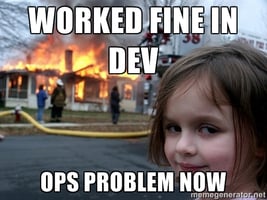Ever since I had the privilege of attending DevOps Days Portland, I have been hearing the way people use the word “DevOps” in a whole new way. Most of the time, DevOps is not the word they should be using.
Metal Toad we made the mistake of creating a Devops Team in 2013. Within a year, we learned how much of a mistake this was as it wasn’t only the DevOps Team that was performing DevOps. It was developers, operations, and management.
Metal Toad quickly learned that Devops is:
-
Not Ops.
-
Not Continuous Integration/Deployment.
-
Not Agile.
-
Not a title, person, or team.
-
Not configuration management.
-
Open collaboration between Developers and Operations.
-
Everyone working hard to help our common client.
-
Blamelessly fixing a problem.
After we learned this mistake, we quickly retitled the DevOps Team to the Managed Services Team. Our group performed the same function as before but our title better reflected with what it was that we were actually doing.
So if DevOps isn’t a special person you need to hire for your company but you still want some of that DevOps magic, what should you do?
First, get your Developers and Operations on the same page. Get the whole team together for project meetings from the very beginning. This allows Operations to see what is coming their way far enough out they can schedule and build out the environment. Group communication also allows the Developers to get suggestions on architecture or new technologies that might improve performance and reliability.
Second, stop blaming each other for bugs and problems. I’m sure everyone has seen the meme...

As funny as the meme is, it’s completely unproductive. Everyone is working on the same side to deliver awesome projects, right?
So what does this look like in action?
For many years, Metal Toad has provided Managed Services to Sony Pictures Television (SPT). To do this effectively, we have worked hand in hand with their developers and both parties present for the daily scrums and weekly status calls. Both teams know of upcoming features and either party can raise red flags for potential problems. It’s a two way street. If a new feature is going to put too much load on a system, Metal Toad will raise a flag. If we are designing and building new servers, SPT’s developers will ask for changes and modifications for better functionality.
This two-way communication is what leads to the high performance, rapid release that everyone is trying to achieve when they use the phrase “DevOps” – albeit inaccurately.